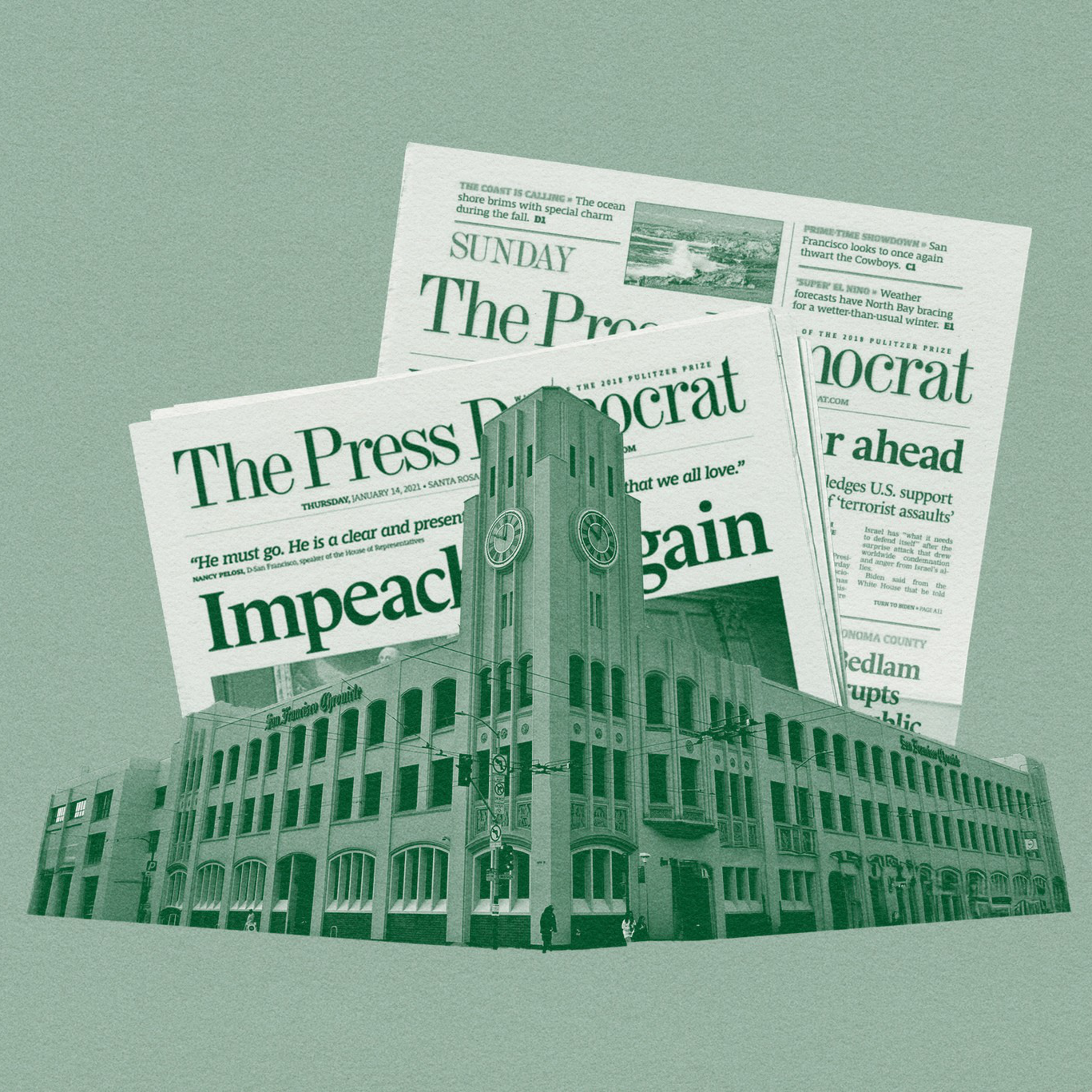Hearst Corp., the New York-based private media conglomerate that owns the San Francisco Chronicle, is nearing an agreement to purchase the Santa Rosa Press Democrat, according to sources close to the deal.
The acquisition would include not only the Pulitzer Prize-winning newsroom — which produces the largest newspaper in the North Bay — but Sonoma Media Investments’ other associated properties, including the Petaluma Argus-Courier and the Sonoma Index-Tribune.
Sources said the deal — which is still being negotiated — would be in the low eight figures and could close in a few months.
Both the Chronicle and the Press Democrat would keep their independent newsrooms as part of the tie-up, but their back office and business functions would be merged and consolidated, the sources said. Hearst believes it could save millions annually through the combined operation of the two organizations, while expanding its coverage into the North Bay, according to the sources.
The Press Democrat was founded in 1897 and was under local ownership for nearly a century before it was sold to the New York Times Company, which sold it to Halifax Media Group in 2011.
Darius Anderson, a local real estate developer and political fixer, purchased the paper in 2012 with help from partners including billionaire banker Sandy Weill; Jean Schulz, wife of the late “Peanuts” creator Charles Schulz; and former Dolby Sound CEO Bill Jasper. The acquisition was meant to stabilize a valuable news source for Sonoma County and return it to local ownership.
During that time, the Press Democrat Guild agreed to freeze its pension program to enable the sale. The new group assembled about $15 million in debt and equity to purchase the newspaper and, in 2019, announced that the business was debt-free and had paid back its original investors.
Douglas Bosco, a former U.S. congressman, is a member of the Press Democrat’s ownership group. When reached for comment, he did not deny that a sale was in the works but said he had no details.
“I will say this, the original investor group, including myself, is aging, and there has been general discussion about passing off or selling the newspapers to some financially capable entities,” Bosco said.
Anderson, who serves as managing member of the ownership entity, Sonoma Media Investments, did not respond to a request for comment. Hearst did not immediately respond to a request for comment.
According to a Press Democrat readership statement in October, the paper prints an average of 20,200 copies daily and serves approximately 19,600 digital subscribers. It employs around 80 people.
Derek Moore, a former Press Democrat reporter and California vice president of the Pacific Media Workers Guild, said the union is concerned about the prospect of new owners with few ties to the region.
“Our preference is for our North Bay news outlets to remain under local ownership, one with a demonstrated belief in quality journalism, community, and treating employees fairly and with respect,” Moore said in a statement. “Hearst, as a billion-dollar empire, has a troubling history of antagonistic relations with employees, undermining their unions, outsourcing and consolidating operations, and generally seeking the bottom line in how it conducts business.”
The Press Democrat Guild’s current contract runs through the fall of 2026.
The prospective acquisition builds on a partnership struck in 2022 in which the Press Democrat outsourced printing operations to the Chronicle’s production site in Fremont as part of an effort to cut costs and divest from real estate holdings. Around 40 part-time and full-time employees were laid off as part of the move.
The deal would also mark a new phase in an extended rivalry between a longstanding big-city newspaper and a smaller, regional competitor.
When both newspapers put forward their coverage of the 2017 Wine Country wildfires for Pulitzer Prize consideration, the Press Democrat was selected as the winner in the breaking news category.
But the Chronicle came out ahead in 2021 with a blockbuster investigation (opens in new tab) into former Windsor Mayor Dominic Foppoli, who was accused by multiple women of sexual assault. The story, which led to Foppoli’s resignation, was co-authored by a former Press Democrat reporter who brought the information to the Chronicle after her editors failed to pursue it (opens in new tab).
Hearst was one of two main suitors that put in failed bids for the newspaper last year, along with controversial Sonoma County developer Bill Gallaher, sources said. A source close to the deal said Gallaher’s offer was “substantially larger” than Hearst’s at the time, but both deals fell apart.
Gallaher and his son-in-law Scott Flater sued the Press Democrat for defamation over reporting about campaign spending during the 2016 Santa Rosa City Council election. The case was dismissed in 2019 by an appellate court (opens in new tab), which ordered the plaintiffs to pay the paper’s legal fees.
The acquisition of the Press Democrat would mark Hearst’s biggest move in Northern California since 2000, when the company purchased the Chronicle and sold off its flagship daily the San Francisco Examiner.
Hearst recently announced that it would relocate the Chronicle newsroom as part of its plans to purchase a downtown San Francisco office building and redevelop a portion of the newspaper’s current complex.
Maya Chupkov, media and democracy program manager at California Common Cause, said the advocacy nonprofit has placed a special focus on the issue of outside owners taking over local newsrooms by private equity firms, as Alden Capital did with The Mercury News and East Bay Times.
“A trend we’re seeing is an acquisition tied to immediate layoffs, stripping of assets, and raising subscriptions in a way that don’t serve the communities where they’re located,” Chupkov said.
Common Cause is weighing legislation in California that would create a 120-day waiting period for acquisitions of local news organizations by an out-of-state entity. Similar laws have passed in Illinois and Maryland.

